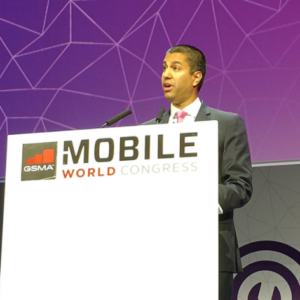The new Republican chairman of the Federal Communications Commission plans to let states decide which telecom providers can divvy out phone and internet subsidies to poor Americans. At the same time he’s rejecting Lifeline providers — including one serving school children — recently approved by the Obama administration.
FCC Chairman Ajit Pai announced plans Wednesday to transfer approval of applications to participate in the agency’s Lifeline program to states, where that power resided before the Obama administration’s FCC overhauled the program in 2016 and gave itself approval power.
“As we implement the Lifeline program – as with any program we administer – we must follow the law,” Pai said. “And the law here is clear: Congress gave state governments, not the FCC, the primary responsibility for approving which companies can participate in the Lifeline program under Section 214 of the Communications Act. This is how the program worked over two decades, over three Administrations, and over eight Chairmanships.”
Pai said the previous administration was guilty of “snatching this legal responsibility away from states and deciding to create its own federal ‘Lifeline Broadband Provider’ designation process.”
“At the time,” he continued, “I explained why the commission lacked the authority to do this.”
Pai voted against the Lifeline expansion plan after a bipartisan proposal with one of the FCC’s Democratic commissioners fell through, but he reiterated he supports adding broadband to the program that formerly only provided subsidies for phone service for as long as he’s chairman.
At the same time, he said the FCC will withdraw its defense against lawsuits from 12 states challenging the FCC’s Lifeline approval power in the D.C. Circuit Court of Appeals, and ask the court to send the case back to the agency.
“And the FCC will soon begin a proceeding to eliminate the new federal designation process,” Pai said.
Hanging in limbo are the applications of nine companies that received approval under then-Chairman Tom Wheeler weeks before Pai took the top office. The new Republican chairman suspended those applications shortly after taking office, pointing out all but one had yet to even take on Lifeline customers.
The exception was Kajeet, which partners with school districts in 41 states and Washington, D.C. to provide off-campus wireless broadband and phones for poor children to do homework. Now Pai is directing the FCC’s Wireline Competition Bureau to reject those applications.
“Hundreds of companies have been approved to participate in the Lifeline program through a lawful process,” Pai said. “Indeed, over 99.6 percent of Americans currently participating in the broadband portion of the program receive service from one of those companies.”
Pai encouraged new companies to “enter the program using this process.”
“Given this context, it would be irresponsible for the bureau to allow companies to sign up customers for subsidized broadband service through an unlawful federal authorization process that will soon be withdrawn,” he added. “This would force many consumers to switch broadband providers in a relatively short period of time, which wouldn’t be fair to them.”
Overall, nine suspensions out of Lifeline’s 900-plus providers affect less than 1 percent of companies participating in Lifeline. But that hasn’t stopped critics of Pai from slamming the chairman for taking actions that seemingly run counter to his pledge “to close the digital divide.”
“Chairman Pai committed that his leadership of the FCC would focus on closing the digital divide,” senior counsel Phillip Berenbroick of the consumer public policy group Public Knowledge said after Pai’s suspensions in February. “He has reneged on that commitment and signaled that the FCC might now be actively hostile toward small, competitive broadband providers and affordable access, which would exacerbate the digital divide.”

